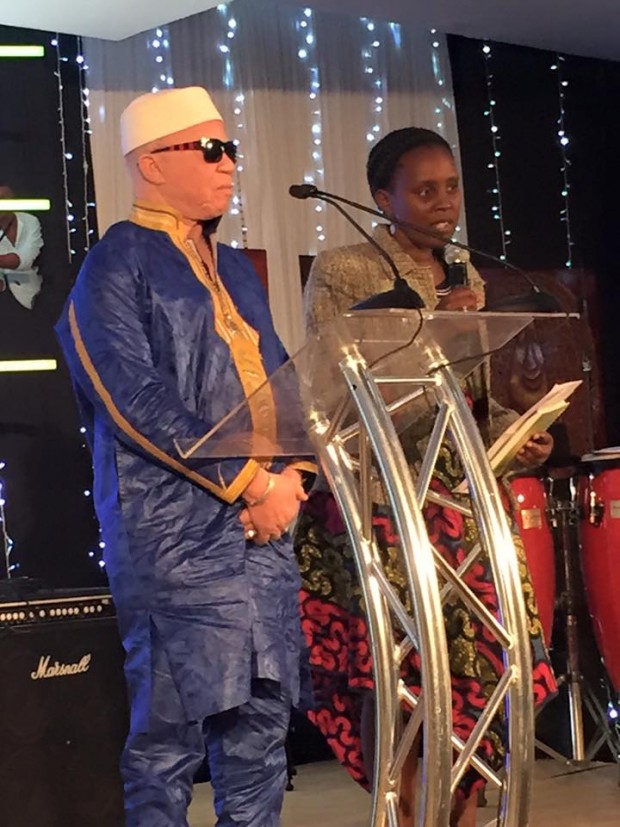
Lately, Dr. Wandia Njoya has been on the limelight in blogs and newspapers for her recent wedding and going against the grain. Last week, she acted as a translator to Celebrated Malian afro-pop singer-songwriter Salif Keita, at the press briefing on Tuesday 25th August, ahead of the Safaricom Jazz festival this last Saturday.
She commented on the Daystar Languages Perf Arts facebook page, “When I was doing French in high school, people told me I was wasting my time. Who cares for language? they said. What job will you get? But I didn’t do it for the market. I just did it. Now I’ve met Salif Keita, and many other international leaders and artists. So don’t listen to those who tell you not to do a subject because there’s no market. Excel in it, share it with the world, and eventually the world will listen to you.”
We interviewed her about the experience, and here is what she had to say.
What prompted you to offer your translation services?
Wandia: I was contacted by the organizers to help with translation, and when it is Salif Keita, who can refuse?
Do you think there are enough translators/ speakers of foreign languages in Kenya?
Wandia: I think the market for translation is there, and it is well supplied, and there’s still a lot of room for growth.
When did you start learning French?
Wandia: As a form 1 in high school.
Why did you decide to study French?
Wandia: I was doing well in it, and at the beginning of each education cycle, it opened doors easier for me than my contemporaries who were studying safe subjects of literature, history and CRE so that they can become lawyers. So I just kept going.
Why are students not picking foreign languages in college?
Wandia: It’s not just foreign languages that Kenyan students don’t do – it’s any language. Ask journalism students to take English or Kiswahili classes and see the kind of reaction you get. I think it comes from our misconception of education – we think school is for teaching only what we don’t know, not for strengthening what we already know.
There’s also a racist misconception that languages come naturally to Africans and so they don’t need to learn anything in school, but more than that, that anything African isn’t worth studying. Yet Americans study English language, and Russians study Russian language in their home countries. As a department, we’ve even heard people say that there’s no need to study English or Kiswahili or Kenyan languages because you can learn them off the street! No country with any sense of self-worth thinks about language like that.
In your blog, you review African music, how did it feel to meet Salif Keita and translate for him?
Wandia: I was so so honored! I am such a fan of Malian music, so I love Salif Keita, Habib Koite, Fatoumata Diawara and Moussa Diallo. I’ve listened now to Salif and Koite live, but I missed Diallo when he was in Nairobi. It was a privilege to be near an African maestro.
According to your view, what is the future of the music industry in Africa?
Wandia: Like Salif Keita said, there’s great potential if our musicians professionalize their work. Part of being professional means you learn your craft, that you’re disciplined, and that you attach a value to your work. But in Kenya, even musicians themselves say that there’s nothing to learn from others about music, yet they expect us to take them seriously.
Salif Keita sings from the griot tradition that is over 10 centuries old. So there’s a future and hope that music can employ many more Africans, but if only African musicians take their craft as seriously as they want listeners to take them.
What is your advice to parents/students regarding the Arts?
Wandia: The arts are worth studying, not just to make money (and there is money in performance and creative industries like event organization, advertising, film making, packaging and marketing).
The arts help with individual discipline, and self-confidence, it also strengthens a country’s identity. People think that there are no jobs in the arts, but the reality is that if you follow students of the same academic year after graduation, the artists’ career may take off slower than the B.Com-ers and Medics, but the artists eventually catch up with their classmates and may even overtake them in terms of income and social impact.
But whether one studies the arts or the sciences, they should choose a career based on long-term prospects, rather than on short term goals like access to immediate employment.
Dr. Wandia holds a Ph.D French, from The Pennsylvania State University in the United States of America, and is currently the Head of Department, Language and Performing Arts, Daystar University. She has a number of publications on linguistics, literature and African politics to her name. She also runs a personal blog at wandianjoya.com.